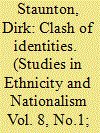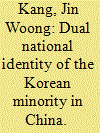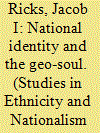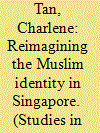| Srl | Item |
| 1 |
ID:
081379


|
|
|
|
|
| Publication |
2008.
|
| Summary/Abstract |
This article examines the controversy surrounding a Chinese Malaysian student's use of the Malaysian anthem in a rap song criticising the corruption of Malaysia and its marginalisation of the ethnic Chinese. Race and religion have been crucial in the imagining of and contestations over the Malaysian nation. They became taboo subjects in the public sphere after the 13 May racial riots in 1969. Language, education, and the mass media became important fields of contestation between the Chinese communities and the Malay-dominant government. With the growing state control of traditional public media such as television, radio, and newspapers, the internet thus became an important space for the stifled public sphere. Concomitantly, dissatisfaction with the dominant party coalition has led increasingly to the growth of a multi-ethnic opposition that encompasses the different ethnic groups. Wee's songs and the political backlash resulting from the government's attempts to suppress it exemplify the convergence of these forces. They also tell us something about the ways in which ethnicity, diaspora, and nationalism intertwine in the imaginings and world-view of a Chinese Malaysian student who felt himself displaced by the national education system. Taiwan, an important cultural and political node in the Chinese overseas imagination, constituted escape, opportunity and an important cultural and political influence but he remains oriented towards his homeland. His songs show how his identity is framed within the local (Muar), the ethnic (vis-a-vis the Malays on the one hand and the other Chinese linguistic communities on the other) and the nation (Malaysia and vis-à-vis Singapore)
|
|
|
|
|
|
|
|
|
|
|
|
|
|
|
|
| 2 |
ID:
081383


|
|
|
|
|
| Publication |
2008.
|
| Summary/Abstract |
Globalisation is affecting communities of people in sometimes surprising ways. One such impact of globalisation has been on the Islamic identity of salafi jihadi groups. Globalisation is driving a decontextualised and deculturalised conception of Islam within salafi jihadi organisations and this fuels identity conflicts with other Muslim groups based on competition between cultural and 'anticultural' forces. This identity conflict culminates in terrorism as a rational and political attempt to 'securitise' group identities that are under attack. This paper seeks to shed light on what is animating salafi jihadi terrorism and examines the Indonesian organisation Jemaah Islamiyah as a case study. The paper concludes that globalisation is leaving a 'footprint' on societies, influencing political and religious movements and inflaming identity conflicts, and that this leads to terrorism. It is thus important that theorists develop detailed proposals to offset the negative impacts of globalisation on global security
|
|
|
|
|
|
|
|
|
|
|
|
|
|
|
|
| 3 |
ID:
081377


|
|
|
|
|
| Publication |
2008.
|
| Summary/Abstract |
The article discusses the recent development of banal forms of nationalism in contemporary Japan by examining a multitude of discourses on food produced by the national government as well as civil organisations working for food safety. Despite the intrinsically hybrid nature marked by the historical trajectory of Japanese food culture, these discourses tend to emphasise and propagate the Japanese element and, in so doing, firmly locate Japanese food as the core of 'Japaneseness'. In this sense, contemporary food discourse in Japan functions as a powerful biopolitical device by propagating the notion of 'delicious food in a beautiful country' on which Japanese people are expected to organise their everyday lives
|
|
|
|
|
|
|
|
|
|
|
|
|
|
|
|
| 4 |
ID:
081381


|
|
|
| 5 |
ID:
081382


|
|
|
|
|
| Publication |
2008.
|
| Summary/Abstract |
This paper investigates the re-centring of religious identity within the geo-body in the developing world through the case study of Thailand, formerly Siam. Although by 1932, monarchic rule and colonial powers had demarcated the 'geo-body' of Siam, the national soul was not yet fully cultivated. After the fall of the absolute monarchy, Prime Minister Phibunsongkhram sought to mould the religio-national identity of Thailand until the religious community's borders coincided with those of the nation-state. One focus of nationalist leaders' efforts was the adaptation and promotion of Buddhist temples throughout the state. These temples became markers of both geographic and cosmological space, serving to infuse the geographic body with a religio-national soul. Thus, the nationalism that developed embraced the fusion of the religious identity with the national identity
|
|
|
|
|
|
|
|
|
|
|
|
|
|
|
|
| 6 |
ID:
081378


|
|
|
|
|
| Publication |
2008.
|
| Summary/Abstract |
This paper discusses how the Singapore government attempted to (re)imagine the Muslim identity in Singapore based on the crisis of the Jemaah Islamiah (JI) arrests in 2002. The paper argues that the government sought to resolve and manage the crisis using the combined apparatuses of the mass media, education and administrative regulations. The paper further analyses the constraints and challenges faced by the government in the process of (re)constructing and sustaining the Singapore Muslim identity. The attempt by the Singapore government provides a useful example of how the government of a multi-ethnic, multi-religious and multi-lingual country has responded to internal terrorist threats by (re)imagining the Muslim identity, and the problems and controversies such a (re)imaging process generates
|
|
|
|
|
|
|
|
|
|
|
|
|
|
|
|
| 7 |
ID:
081380


|
|
|
|
|
| Publication |
2008.
|
| Summary/Abstract |
This paper seeks to understand the role of nationalism in China's policy towards the combat of emerging infectious diseases. By locating nationalism as a factor which facilitates or impedes global governance and international collaboration, this paper explores how nationalism influences China's political decision-making. Given her historical experience, China has in its national psyche an impulse never to become 'the sick man of the East' again. Today, China's willingness to co-operate with international bodies emanates out of reputational concerns rather than technical-medical considerations. This was clearly manifested in her handling of two epidemics in recent years: the Severe Acute Respiratory Syndrome (SARS) and HIV/AIDS episodes. This paper concludes that China's nationalism plays an inhibiting role in China's attempts to further incorporate herself into the architecture of global health governance in the long run.
|
|
|
|
|
|
|
|
|
|
|
|
|
|
|
|